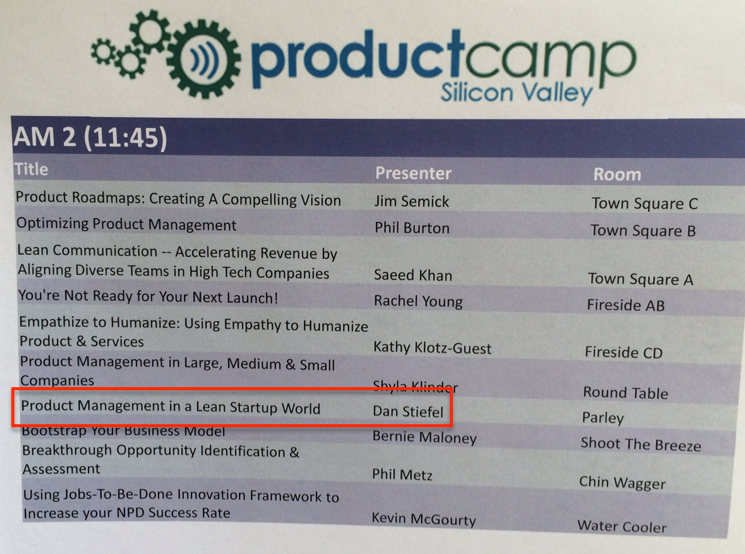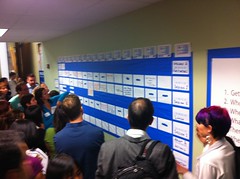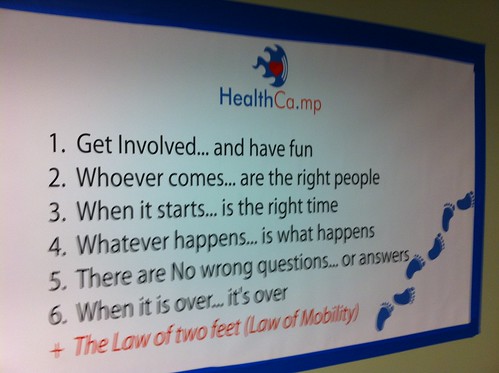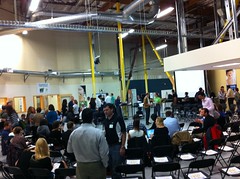The second session that I attended at Product Camp Silicon Valley was titled Product Management in a Lean Startup World, led by Dan Stiefel (@DanStiefel). I’ve met Dan at a couple of San Francisco based Product Management events.
He is very active in the Lean Startup community in the Bay Area and is one of the people behind Lean Startup Circle. There were some good takeaways for me in this session. It reinforced the basic ideas of Lean and there was some spirited discussion about the Lean hype cycle and how many of the Lean Best Practices are things that successful entrepreneurs have been doing before Lean became a buzz word.
Here are my notes from the session…
Dan ran this session using the classic unconference format. No prepared slides and he made it clear from the beginning that we were all going to participate. This is the format that I prefer, so the session was off to a good start.
To make sure everybody in the room was on the same page, Dan asked attendees to provide definitions of some of the Lean terms and then offered some of his insights.
Basic premise of Lean
Test a hypothesis, validate it in your market
Minimum Viable Product aka MVP
- Helps you to avoid spending 18 months building something that nobody wants
- You know that it’s missing things but you want to put it out there
- Your MVP should be tied to a question / hypothesis
Product / Market Fit
- It really solves something
- It doesn’t just fit for one or two customers
- You’re looking for market fit
- Compare your product to the next best thing that is available. What is your competitive advantage?
It’s important to hold yourself or someone in your organization accountable for the outcome of the testing of your MVP. It’s really easy to make excuses about why the test failed – e.g. you don’t know what a 2% conversion means, so you dismiss it and continue moving forward with your product. Before you validate your hypothesis, it’s important to understand how you define success and what your most important metrics really mean.
Equally imortant is having a plan for what you’re going to do next after you see the results of the test, even if it’s not the result that you were hoping for. The key thing is that you learn something and adjust the course of your product based on what you’ve learned.
Challenges along the way…
Sometimes the peson who is holding the purse strings already has in mind what they want the product to be and they want to use the Lean process as “proof” that this is the right decision. This is a tough environment because you should be prepared to go in a different direction and not be overly attached to the original idea.
Someone made the point that they were practicing Lean long before any of this Lean terminology came along and that most of what was being dicsussed is nothing new – i.e. all of these Lean buzz words is just repackaging of things we’ve been doing along. I thought Dan did a good job of acknowledging this point and reinforcing that one of the goals of this session is getting past the buzz words and talking about what it really takes to do the hard work that is needed to successfully practice Lean.
Some advice when you are talking to customers or potential customers…
Ask about their pain points and what problems they are trying to solve without pitching your product. You’ll be much happier with the results because they’re going to be more open about their problem space and they won’t narrow it based on what they think your product is supposed to do.
Someone in the room said that the most successful startups in Silicon Valley acted as if you had already solved the problem before they had a complete solution. Someone else made the point that passion and belief in your product is important but you can’t allow the passion to make you overly attached to your original idea.
Another problem that people in the room faced is working with a really smart set of engineers who have built something really cool but have no idea if someone will pay for the product. This type of organization can really benefit from Lean.
Need passion without the attachment.
Pivot vs Persevere
Pivoting means that you change direction based on something you’ve learned. You’re still using something that you’ve already built, so you aren’t starting over from scratch.
If you’re staying the course based on some confidence that you’ve achieved or are close to achieving product / market fit, the you are persevering.
A question came up asking how Lean fits in with Agile. Lean is more about what to build. Agile gives you a way to build it faster. When you’re using Agile to build something the question to ask yourself is: are you building the right thing? Lean can help you with this.
There was also a question about the name of this session “Product Management in a Lean Startup World.” Is Lean only for startups or can it also be applied to Enterprise? Dan made it very clear that Lean is not specific to startups and definitely has a place in Enterprise.
Continuing the conversation
The hour flew by and we didn’t get very far into topics such as where exactly does the Product Manager role fit into Lean and what are the differences between practicing Lean in a small startip versus a large enterprise. Dan proposed that we use the hashtag #LeanStartupProdMgmt for continued conversation about this.




